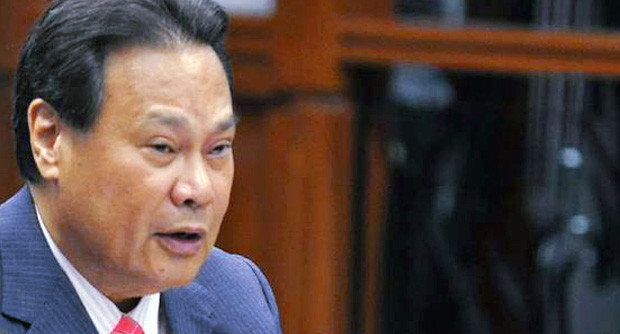The justice who voted against the Sandiganbayan Third Division’s decision to put former Chief Justice Renato Corona on trial said he was confused by the law that requires public officials to disclose their finances.
In his dissenting opinion, Associate Justice Samuel Martires spoke against “flaws and deficiencies that may have greatly contributed to (the) chaotic implementation” of Republic Act No. 6713 or the Code of Conduct and Ethical Standards for Public Officials and Employees.
“Like other government employees, I, too, am getting confused with the law, specifically on the provisions regarding SALN (statement of assets, liabilities and net worth),” Martires said.
“Just recently the SALN form was again revised from the usual simple form to a more complicated one. This caused me to ponder what is really the requirement of the law as regards the SALN. I am fast sinking into a quagmire of intellectual darkness due to lack of accurate guidance from the implementing agency,” he said, referring to the Civil Service Commission (CSC).
Martires was outvoted 1-4 by a special panel of five that was formed after the three-member Third Division failed to reach a unanimous decision.
Sandiganbayan Presiding Justice and Third Division Chair Amparo Cabotaje-Tang wrote the decision, which was concurred in by division member Associate Justice Theresa Gomez-Estoesta.
Associate Justices Jose Hernandez and Alex Quiroz from the Fourth Division shared the majority opinion.
The 36-page resolution debated the points raised in the 64-page dissenting opinion, something not usually seen in a court resolution.
Probable cause
In the resolution dated Aug. 13 but issued only yesterday, the Sandiganbayan Special Third Division upheld the charges brought by the Ombudsman against Corona for making untruthful statements and not declaring properties and several bank accounts in his SALN for 2003 to 2010.
“There is probable cause that perjury and violation of Section 8 of RA 6713 were committed and that the accused is probably guilty of, hence he ought to be arrested and held for trial,” the antigraft court said.
Corona, who was removed from office after an impeachment trial in 2012 for undeclared bank deposits and other assets, posted bail last year.
He was charged with perjury and violation of RA 6713 for each of the eight questioned SALNs from 2003 to 2010.
Palace right
Malacañang, which spearheaded Corona’s impeachment as part of the Aquino administration’s reform program, on Saturday said the court’s resolution showed the validity of the government’s reasons for seeking his ouster three years ago.
“Our belief then has been validated now by the fact of the indictment,” deputy presidential spokesperson Abigail Valte said.
“It shows that our position has always been grounded on facts and not blind animosity [toward] former Chief Justice Corona as he would have the public believe,” she said.
The administration supported the House of Representatives in impeaching Corona, following President Aquino’s campaign statement that he would not recognize him because he accepted a midnight appointment from outgoing President Gloria Macapagal-Arroyo.
After winning the presidential election, Mr. Aquino took his oath of office not before Corona but before then Supreme Court Senior Associate Justice Conchita Carpio Morales, now the Ombudsman.
No legal basis
In his dissent, Martires said there was no legal basis for the charges and argued that Corona could not be charged with both perjury and violation of RA 6713 over the questioned SALNs.
Martires also said the Ombudsman was “devoid of authority to file these cases.”
He said Corona should no longer be charged under
RA 6713 since he was already meted the most severe penalty provided by the law when he was removed from office.
Quoting long passages from the congressional debates during the writing of the law, Martires said Corona was not given the chance to correct his SALN.
“Corona was denied this ‘protection’ which was guaranteed by law to every public official or employee,” he said.
“The Ombudsman simply disregarded the clear directive of Section 10 of RA 6713 to let Corona correct the inaccuracies or deficiencies in his SALN,” Martires added.
‘Out of context’
But the majority opinion said the provision was “far from any ambiguity” and that Martires may have taken the congressional debate “out of context.”
Contradicting Martires’ opinion again, the court said the Ombudsman had the power to initiate an investigation and file charges without waiting for findings of irregularity from the CSC or the committee of the branch of government that received the SALNs. With a report from Nikko Dizon
RELATED STORIES
Sandigan justice: Corona should not be tried for perjury
Sandigan finds probable cause to put Corona on trial for perjury
